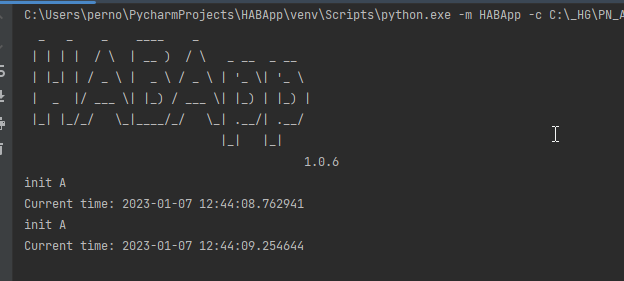Hi, me again, trying to work out how to use your class Eascheduler outside the HABApp.Rule, but does not get it right. My attempt yields ‘RuntimeError: no running event loop’. What am I missing?
from eascheduler.executors import AsyncExecutor
from eascheduler.schedulers import AsyncScheduler
from eascheduler import SchedulerView
from datetime import timedelta, datetime
class ScheduleTest:
def __init__(self):
self.scheduler_view = SchedulerView(scheduler=AsyncScheduler(), executor=AsyncExecutor)
print('init A')
self.repeat_job = self.scheduler_view.every(start_time=datetime.now(), interval=timedelta(seconds=5), callback=self.do_something())
print('init B')
def do_something(self):
print(f'Current time: {datetime.now()}')
ScheduleTest()

HABlog:
[2023-01-07 12:44:09,268] [ HABApp.Rules] ERROR | File "C:\_HG\PN_AUTOMATION\CODING\Python\habapp_test_env\rules\dev\eascheduler_test.py", line 12, in __init__
[2023-01-07 12:44:09,268] [ HABApp.Rules] ERROR | self.repeat_job = self.scheduler_view.every(start_time=datetime.now(), interval=timedelta(seconds=5), callback=self.do_something())
[2023-01-07 12:44:09,269] [ HABApp.Rules] ERROR | File "C:\Users\perno\PycharmProjects\HABApp\venv\lib\site-packages\eascheduler\scheduler_view.py", line 60, in every
[2023-01-07 12:44:09,269] [ HABApp.Rules] ERROR | job._schedule_first_run(start_time)
[2023-01-07 12:44:09,269] [ HABApp.Rules] ERROR | File "C:\Users\perno\PycharmProjects\HABApp\venv\lib\site-packages\eascheduler\jobs\job_base_datetime.py", line 46, in _schedule_first_run
[2023-01-07 12:44:09,269] [ HABApp.Rules] ERROR | self._set_next_run(self._next_run_base)
[2023-01-07 12:44:09,269] [ HABApp.Rules] ERROR | File "C:\Users\perno\PycharmProjects\HABApp\venv\lib\site-packages\eascheduler\jobs\job_base.py", line 48, in _set_next_run
[2023-01-07 12:44:09,269] [ HABApp.Rules] ERROR | self._parent.add_job(self)
[2023-01-07 12:44:09,270] [ HABApp.Rules] ERROR | File "C:\Users\perno\PycharmProjects\HABApp\venv\lib\site-packages\eascheduler\schedulers\scheduler_async.py", line 53, in add_job
[2023-01-07 12:44:09,270] [ HABApp.Rules] ERROR | self.worker = create_task(self._run_next())
[2023-01-07 12:44:09,270] [ HABApp.Rules] ERROR | File "C:\Users\perno\AppData\Local\Programs\Python\Python310\lib\asyncio\tasks.py", line 336, in create_task
[2023-01-07 12:44:09,270] [ HABApp.Rules] ERROR | loop = events.get_running_loop()
[2023-01-07 12:44:09,270] [ HABApp.Rules] ERROR | RuntimeError: no running event loop
